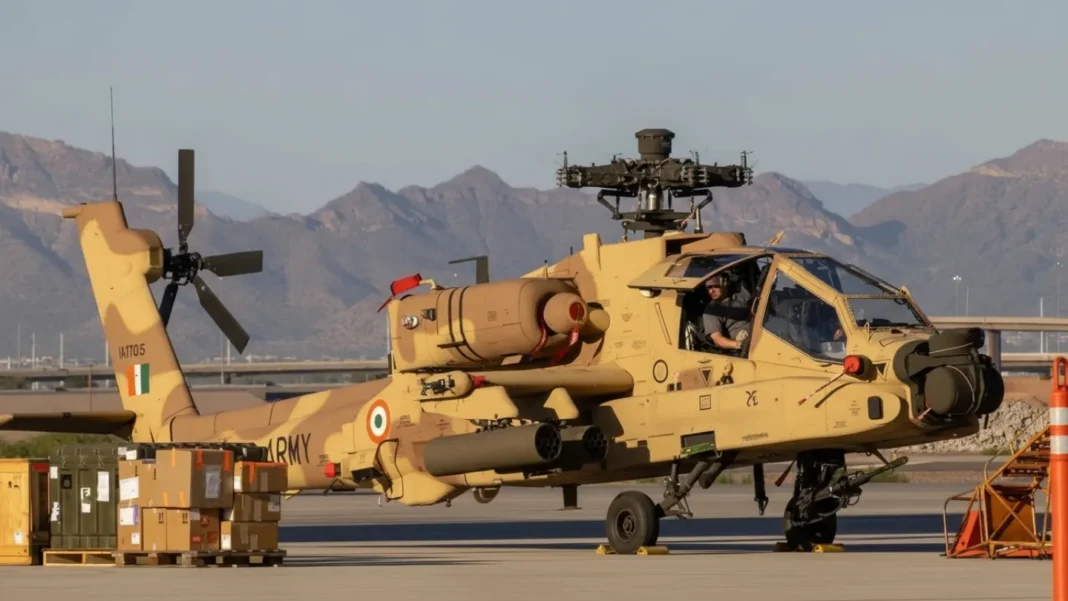Turkey Blocks Apache Delivery to India: A Defence Deal Turns Into a Power Play
Sometimes geopolitics speaks in loud threats, sometimes it whispers in airspace permissions. This time, it was the second one.
Three AH 64E Apache attack helicopters, fully painted in Indian Army desert colours and ready for induction, were quietly being flown across the world. Their journey should have been straightforward. Instead, it became a detour that exposed how far some nations will go to needle India.
The Antonov An 124 carrying the Apaches reached England, stayed parked for eight days and then, without warning, flew all the way back to the United States. Boeing blamed “logistical issues,” but sources on the ground say something else entirely.
What stopped the flight was not weather or paperwork, but Turkey.
India’s long and painful Apache delivery suddenly collided with Ankara’s political revenge.
India’s second batch of AH 64E Apache attack helicopters was supposed to complete a crucial modernisation cycle for the Indian Army.
Officially, Boeing blamed “logistical issues.”
Unofficially, reliable sources say something far more deliberate occurred.
Turkey allegedly denied airspace clearance to the transport aircraft carrying India’s Apaches, forcing a rare and expensive mid route reversal and exposing just how far Ankara is willing to go to needle India after siding with Pakistan in the May 2025 conflict.
Key Details at a Glance
| Aspect | Information |
|---|---|
| Helicopter Model | AH 64E Apache Guardian |
| Total Indian Army Order | 6 helicopters (2020) |
| Batch in Transit | 3 helicopters |
| Transport Aircraft | Antonov An 124 UR 82008 |
| Route | USA → UK → India (planned) |
| Unexpected Event | Returned from UK to USA |
| Official Reason | Boeing cited logistical issues |
| Source Based Reason | Turkey denied airspace clearance |
| India–Turkey Trigger | Turkey supporting Pakistan in May 2025 conflict |
| Contract Value | About 600 million USD |
| Intended Deployment | High altitude & western border sectors |
| First Batch Arrival | July 2025 |
Quick Context
Three AH 64E Apaches fully painted in Indian Army desert camouflage were loaded onto an Antonov An 124 at Mesa, Arizona. The aircraft flew to England, sat grounded for eight days, and then unexpectedly returned to its point of origin.
Antonov An-124 UR-82008 arrived at KIWA this afternoon from Leipzig, Germany, to pick up 3 AH-64E Apaches for the Indian Army. pic.twitter.com/5PNuAYGIcx
— KIWA Spotter (@KiwaSpotter) October 30, 2025
You can see the second of 3 being loaded into UR-82008 this past Wednesday. https://t.co/BizV2fPxSs pic.twitter.com/EE8qOdVXoZ
— TSW1 (@TheShipWatch_1) October 30, 2025
This is not how defence logistics normally work. When a multi million dollar consignment reverses course, something significant has intervened.
How the Apache Delivery Became a Geopolitical Dead End
The helicopter shipment followed a standard route until it reached East Midlands Airport in England. After eight days on the ground and no onward clearance, the aircraft flew back to Arizona where the helicopters were unloaded.
Industry sources revealed that Turkey refused to grant airspace clearance to the An 124. When an oversized cargo aircraft such as an An 124 loses access to a key corridor, alternative options become limited. Longer routes increase cost, fuel load and flight permissions, often making the journey impractical.
This was not a technical glitch. This was geopolitical signalling.
Why Turkey Denied Clearance
Turkey’s actions need to be viewed through the prism of the May 2025 four day conflict between India and Pakistan. During the crisis, Ankara went beyond diplomatic commentary and took active positions against India.
What Turkey did:
• Condemned India’s Operation Sindoor which targeted terror infrastructure.
• Provided Pakistan with drones and battlefield intelligence.
• Amplified anti India messaging internationally.
• Repeatedly raised Kashmir at global forums including the UN.
India responded by blocking Turkish media handles accused of misinformation, revoking security permissions for Turkish aviation service firms and deepening strategic ties with Turkey’s rivals including Greece, Armenia and Cyprus.
In this environment, Turkey’s denial of airspace to a defence consignment headed toward India closely aligns with its increasingly adversarial posture.
Why This Matters for India’s National Security
The AH 64E Apache is not a ceremonial aircraft. It provides India with high intensity warfighting ability in high altitude and contested environments along both the Pakistan and China borders.
Key Apache capabilities:
• Hellfire missiles capable of anti armour and bunker strikes.
• Longbow radar that scans, prioritises and tracks 128 targets in under a minute.
• Ability to engage 16 targets simultaneously.
• FLIR based night and all weather combat capability.
• Manned Unmanned Teaming for drone coordination.
• High altitude performance essential for Ladakh and Arunachal.
A delay in Apache induction slows down India’s ability to close capability gaps in sectors where both Pakistan and China have modernised ground assets.
The Larger Geopolitical Shift
The incident signals a deeper reality. The Pakistan Turkey China triangle has grown more aligned in recent years. Their cooperation spans drones, intelligence, diplomatic backing and coordinated political messaging.
Airspace denial is now an extension of this alignment. It also shows that even routine military deliveries can be obstructed by nations that act against India’s interests.
India is already responding by expanding defence and strategic cooperation with nations that counterbalance Turkish influence in the Mediterranean. These include Greece, Cyprus, Armenia and Egypt.
What This Delay Really Tells Us
The Apache delay is temporary. The message behind the delay is not. Turkey has moved from diplomatic criticism to operational obstruction.
For India, the lesson is clear. Critical defence deliveries must never depend on transit routes controlled by unfriendly nations. Modernisation demands secure corridors, predictable partners and diversified pathways.
India’s Apaches will arrive. But Turkey’s interference has only strengthened New Delhi’s resolve to widen its strategic choices and reduce exposure to political vetoes in global logistics.
Samay’s Voice
Turkey can block a flight path. It cannot block India’s trajectory.



